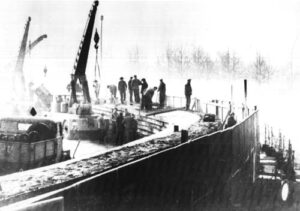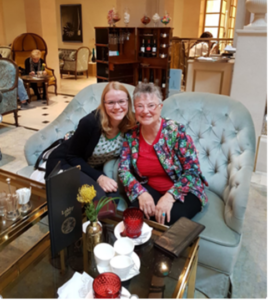
“It’s August 13, 1961 – the day East Berlin starts building the wall,” my grandma remembers.
“On Sunday night, August 13, Walter Ulbricht, East German head of state, issues an order to close the Berlin border. Police forces put up barbed wire fences. Within one day, West Berlin became an island in the sea of communism. Trains do not run anymore, and West and East Berliners stand shocked on opposite sides of the border.
I hear about it at Moabit hospital, where I just gave birth to my first child on August 9. I remember being afraid of a new war and feeling helpless in the hospital, alone with my child, barely 20 years old. Also, we’re separated from our family. My grandparents lived in the Russian sector after the war, just ten minutes from where we lived in the American sector. My husband had fled to West Berlin from Rostock in the East to marry me. His parents, grandparents, sister, and other relatives still live there. I feel so helpless and yearn for my family. The future seems so unsure.”
The first time my grandma saw her family again was on Christmas Eve 1963. She was pregnant once more with my father and was lucky to get a visa quickly. My grandpa couldn’t come with her since he had fled from the East, and there was the constant threat of soldiers arresting him at the border. The family came together for just a few memorable hours before parting again, not knowing if and when they’d see each other again.

My grandma: slightly grey hair, an infectious laugh, small stature but fierce as one can be. She’s a collector of things. Her apartment is like a never-ending surprise of mementos. Collecting things and archiving them in folders, boxes, and paper stacks has been a life-long passion. She’s a passionate European and part of the European Friends Circle Berlin. Just recently, she designed her own banners and flags for a freedom demonstration supporting Ukraine. Marching with thousands of others in Berlin, she showed her solidarity. At her age, that’s quite remarkable.

“It’s June 1, 2009,” my journal tells me.
“I’m at my grandma’s house where I’ll spend a couple of days. It’s the Pentecost weekend, and we want to visit some children’s festivities at the Alex, a popular square in Berlin. When we get to the square downtown, nothing’s happening – apparently, the internet lied. But my grandma wouldn’t be my grandma if she didn’t have five different plans and suggestions of what to do instead. So we board a boat.”
I have enjoyed many boat tours in Berlin with my grandma, but this day is quite a memorable one because after the boat tour, we visited the Berlin Cathedral.
“The inside looks quite impressive with the white golden altar and three big life paintings at the back, one depicting Jesus on the cross. We light candles for the family members whom I never met. We climb the 266 steps to the top of the dome, moss green and partially black because of the oxidization. What a splendid 360° view of Berlin! The wind’s in my hair as I watch the Spree river and beyond to the red cathedral and the television tower. No wall’s dividing the city anymore.”
Now, every time I see the cathedral, it reminds me of this moment. I’ve not climbed to the top since then. It has remained a very special memory.
Berlin is a city that’s quite important in our country’s and in my family’s history. On my grandma’s 49th birthday, West Germany and East Germany officially reunited. Every year on her birthday (October 3, 1941), we not only celebrate my grandma’s birth but also the birth of a united country. My grandma has lived in Berlin all her life. She was alive throughout the Cold War, and she was alive when East Germany built the wall. She married my grandpa in 1961, raised two kids, and was there when the wall fell in 1989. She was one of the first people to stand by the wall, hammering out stones that she still gives to people today.
Berlin is like a giant melting pot. Through my visits, I experienced various cultures mingling on the streets and in cafés. It comes as no surprise that I study cultural studies since people, social relations, and how culture develops and shapes our identity have always interested me and, I believe, have shaped my identity. The visits to Berlin with my grandma taught me to try new things and always search for new adventures. My grandma has also ignited my love for history. You can’t travel to the city and fail to stop at the parts of the wall still standing or visit any of the great museums. One visit I remember very clearly was to the Memorial Berlin Hohenschönhausen, which was a Soviet special camp and a Stasi (state security) prison.
Berlin is like family. All of my memories are so vivid, showcasing my deep love for my family. Every time I visit, there is this sense of familiarity I feel even though a city as big as Berlin seems to swallow you up in no time. It’s a city that celebrates history, that celebrates people and movements, that celebrates culture. I might not have been born in Berlin or speak the Berlin dialect, but still the words of John F. Kennedy ring true for me as well: “Ich bin [auch] ein Berliner.”
8,202 Total Views, 2 Views Today






